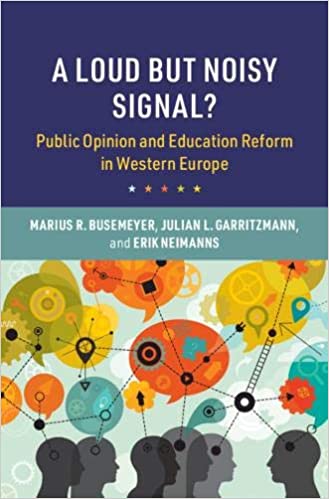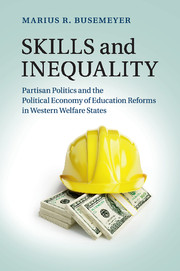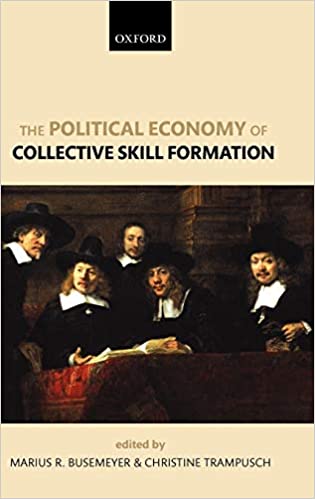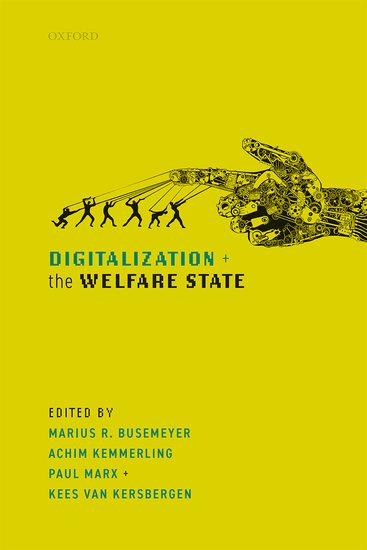
Prof. Dr. Marius R. Busemeyer
See below for short overview of the most important publications, followed by a (rather complete) list of publications including links to full-texts, if available.

This path-breaking addition to the Comparative Politics of Education series studies the influence of public opinion on the contemporary politics of education reform in Western Europe. The authors analyze new data from a survey of public opinion on education policy across eight countries, and they also provide detailed case studies of reform processes based on interviews with policy-makers and stakeholders. The book's core finding is that public opinion has the greatest influence in a world of 'loud' politics, when salience is high and attitudes are coherent. In contrast, when issues are salient but attitudes are conflicting, the signal of public opinion turns 'loud, but noisy' and party politics have a stronger influence on policy-making. In the case of 'quiet' politics, when issue salience is low, interest groups are dominant. This book is required reading for anyone seeking to make sense of policy-makers' selective responsiveness to public demands and concerns.
"This is an important book that could change how we think about representation." (Christopher Wlezien, University of Texas at Austin)
"This book brings together an enormously impressive cross-national data-collection effort with an innovative theoretical approach [...]." (Pepper D. Culpepper, Oxford University)
"[The authors] masterfully combine research on partisan politics, public opinion, and welfare state reforms to show what a key battlefield of distributive politics education has become in the knowledge society." (Silja Häusermann, University of Zurich)

Skills and Inequality studies the political economy of education and training reforms from the perspective of comparative welfare state research. Highlighting the striking similarities between established worlds of welfare capitalism and educational regimes, Marius R. Busemeyer argues that both have similar political origins in the postwar period. He identifies partisan politics and different varieties of capitalism as crucial factors shaping choices about the institutional design of post-secondary education. The political and institutional survival of vocational education and training as an alternative to academic higher education is then found to play an important role in the later development of skill regimes. Busemeyer also studies the effects of educational institutions on social inequality and patterns of public opinion on the welfare state and education. Adopting a multi-method approach, this book combines historical case studies of Sweden, Germany, and the United Kingdom with quantitative analyses of macro-level aggregate data and micro-level survey data.
"This is a book about education, but it is also a book about the perhaps most pressing issue of our time: rising inequality." (Torben Iversen, Harvard University)
"This original and important book opens our minds to a central but understudied aspect of the welfare state and, just as Esping-Andersen did a generation before, is destined to alter the field of comparative political economy." (Cathie Jo Martin, Boston University)
"This book is invaluable as it aims at reconciling comparative welfare state with scholarly work on education and training systems. The combination of masterly theoretical reflection, rigorous statistical analysis and case study research is social science at its best and a must-have for every bookshelf." (Herbert Obinger, University of Bremen)
"This is a remarkable book on a very important topic. Busemeyer’s Skills and Inequality elegantly integrates analyses of welfare capitalism and educational systems into an argument that helps us better understand the politics of inequality." (David Rueda, Oxford University)

Education, skill formation, and training continue to be important areas of consideration for both public policy and research. This book examines the particular types of vocational training known as collective skill formation systems, whereby the training (often firm-based apprenticeships) is collectively organized by businesses and unions with state support and cooperation in execution, finance, and monitoring.With contributions from leading academics, this book is the first to provide a comprehensive analysis of the varying historical origins of, and recent developments in, vocational training systems, offering in-depth studies on coordinated market economies, namely Germany, Austria, Switzerland, the Netherlands, and Denmark. It also contains comparative chapters that analyze how these countries react to common challenges such as deindustrialization, labor market stratification, academic drift, gender inequalities, and Europeanization.Whereas previous research has focused on the differences between various kinds of skill regimes, this book focuses on explaining institutional variety within the group of collective skill formation systems. The development of skill formation systems is regarded as a dynamic political process, dependent on the outcome of various political struggles regarding such matters as institutional design and transformations during critical junctures in historical development.

This volume explores how digitalization—in different forms—affects the welfare state. Digitalization is likely to have a lasting impact on work, welfare, and the distribution of income. It will radically transform not only social risks in health, education and the labour market, but also the means by which these risks are addressed. The volume studies how digitalization affects policies as well as the underlying power relationship between actors, i.e. the politics of the welfare state.
The volume brings together internationally renowned welfare-state scholars to identify
- the socio-economic challenges that result from rapid technological change;
- the ensuing political conflicts and struggles in the domain of welfare state reform broadly defined;
- how these changes challenge and shape existing labour market and welfare state arrangements.
Overall, the volume explains the potential and real political and policy responses to these challenges, grasps the contours of future developments, and reflects on whether the current wave of technological change might promote the emergence of a new paradigm of welfare state policy-making.
The rapid and accelerating pace of technological change has potentially radical ramifications for the welfare state that demand an engagement with possible future scenarios. The authors therefore adopt a forward-looking perspective. Based on this approach, the volume uniquely offers a theoretically informed empirical basis for social science and public debates about the long-term implications of the digital revolution for the welfare state, covering a broad range of policy areas such as education, pensions, labour market policies, tax policy, and health care.
Most important journal publications:
Busemeyer, Marius R./Abrassart, Aurélien/Nezi, Roula, 2021. Beyond positive and negative: New perspectives on feedback effects in public opinion on the welfare state, British Journal of Political Science 51/1: 137-162, DOI: https://doi.org/10.1017/S0007123418000534
Busemeyer, Marius R./Thelen, Kathleen, 2020. Institutional Sources of Business Power, World Politics 72(3): 448-480 (with Kathleen Thelen). DOI: https://doi.org/10.1017/S004388712000009X
Busemeyer, Marius R./Iversen, Torben, 2020. The welfare state with private alternatives: The transformation of popular support for social insurance, Journal of Politics 82(2): 671-686, DOI: https://doi.org/10.1086/706980
Garritzmann, Julian L./Busemeyer, Marius R./Neimanns, Erik, 2018. Public Demand for Social Investment: New Supporting Coalitions for Welfare State Reform in Western Europe? Journal of European Public Policy 25/6: 844-861, DOI: https://doi.org/10.1080/13501763.2017.1401107
Busemeyer, Marius R./Garritzmann, Julian L./Neimanns, Erik/Nezi, Roula, 2018. Investing in Education in Europe: Evidence from a New Survey of Public Opinion, Journal of European Social Policy 28/1: 34-54, DOI: https://doi.org/10.1177/0958928717700562
Busemeyer, Marius R./Garritzmann, Julian L., 2017. Public opinion on budgetary and policy trade-offs in European welfare states: Evidence from a new comparative survey, Journal of European Public Policy 24/6: 871-889, DOI: https://doi.org/10.1080/13501763.2017.1298658
Busemeyer, Marius R./Iversen, Torben, 2014. The Politics of Opting Out: Explaining educational financing and popular support for public spending, Socio-Economic Review 12(2): 299-328, DOI: https://doi.org/10.1093/ser/mwu005
Busemeyer, Marius R., 2013. Education funding and individual preferences for redistribution, European Sociological Review 29(6): 1122-1133, DOI: https://doi.org/10.1093/esr/jcs085
Busemeyer, Marius R./Trampusch, Christine, 2011. Comparative Political Science and the Study of Education (Review Article), British Journal of Political Science, 41/2: 413-443, DOI: https://doi.org/10.1017/S0007123410000517
Busemeyer, Marius R., 2009. Asset Specificity, institutional complementarities and the variety of skill regimes in coordinated market economies, Socio-Economic Review 7/3: 375-406, DOI: https://dx.doi.org/10.1093/ser/mwp009
Busemeyer, Marius R., 2009. From Myth to Reality: Globalization and Public Spending in OECD Countries Revisited, European Journal of Political Research 48/4: 455-482, DOI: https://dx.doi.org/10.1111/j.1475-6765.2009.00838.x.
Busemeyer, Marius R., 2007. Determinants of Public Education Spending in 21 OECD countries, 1980-2001, Journal of European Public Policy 14/4: 582-610, DOI: https://doi.org/10.1080/13501760701314417
